Kingdom Come: Deliverance - Royal Edition
I was a Kickstarter backer for Kingdom Come: Deliverance. At first, I was eager to follow the development, but over time grew old doing so. KCD finally released in early 2018. Unfortunately, it was quite broken at launch, with a myriad of bugs and glitches. Having waited 5 years, I decided to wait another few months. Warhorse Studios continued fixing the game - it was obviously it was rushed out too early. I waited over half a year, till the game was finally in a decent state. Then I waited another year for the Royal Edition, before playing all the DLCs and wrapping up some pending side quests. KCD has been a long, long journey for me, but it finally came to a close towards the end of 2019, after 120 hours of play. Like my previous review on Red Dead Redemption 2, this took quite a while to write, and it'll be another special feature. I promise to get back to regular reviews after this!
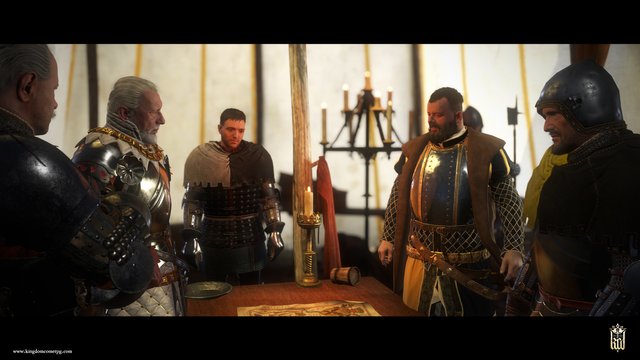
In some ways, while very different games, Kingdom Come: Deliverance shares some general concepts with Red Dead Redemption 2. Both games eschew fantasy for realistic period settings, both feature a more meditative pacing. They are narrative-heavy with significant character development. Their open worlds are more open, free-flowing, and resists bloating it with random filler events. Their worlds contain a whole slew of mechanics, and these mechanics have a certain "analog" quality to it. KCD goes much farther than RDR2, though. Instead of just pressing a button, you have to perform a deliberate, methodical action with the controller, which needs to be learned. You don't just press a button to lockpick, you have to learn the tangible, tactile technique to do so on your controller. BGS games have definitely had these sorts of minigames, but KCD goes farther with more intricate mechanics.
Now, there are definitely two sides to this debate. Many will say that these minigames can be intrusive and break pacing of the game. Others will say that elaborate minigames make the game more immersive. I think the reason it works in KCD is because the rest of the game is paced accordingly. As mentioned before, the open world has vast spaces of wilderness and emptiness, it doesn't feel the need to fill it in with random events. So goes for the narrative, which is a slow boil. Or the combat system, which is definitely based more on strategy and rhythm than button mashing. In most games, making a potion is a simple matter of having the ingredients, and holding a button. In KCD, you have collect your ingredients in various containers, follow the instructions in the recipe including the order and quantity of adding each ingredient. Some special potions have rather elaborate recipes, which contain multiple steps. Most games will shy away from such a mechanic, calling it simply a waste of time, and assuming the player will get bored and quit. But it works in KCD because it's consistent with the general mood of the game.
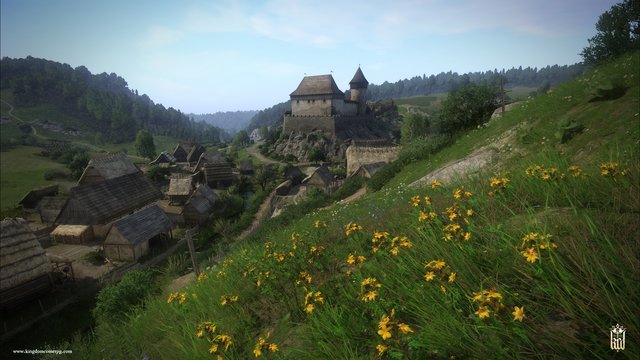
Of course, this game will not be for everybody. While obviously inspired by games such as The Witcher 3 and Skyrim, it's got its own charm and pacing, with a focus on realism. Yet, make no mistake, it's very much a game with a fair number of conveniences. Like Red Dead Redemption 2, I think Kingdom Come: Deliverance achieves the thin line of perfection between making everything too fast-paced, instant gratification and easy; or making things too realistic, ponderous and just plain boring.
KCD's visual style is rather interesting - it goes for an almost photorealistic approach, which does feel rather strange - even "plain" - at first as most games go for a highly stylized look. But you soon get used to it, and the open world - it offers a unique sense of immersion that's rare in gaming. A special mention for the facial models - it sets a new bar for RPGs with all dialogue fully motion captured. Sure, it's nowhere near as convincing as a cutscene from a AAA linear game, but it's the best I've seen from RPGs with branching dialogues. Of course, some of the side characters aren't as detailed.
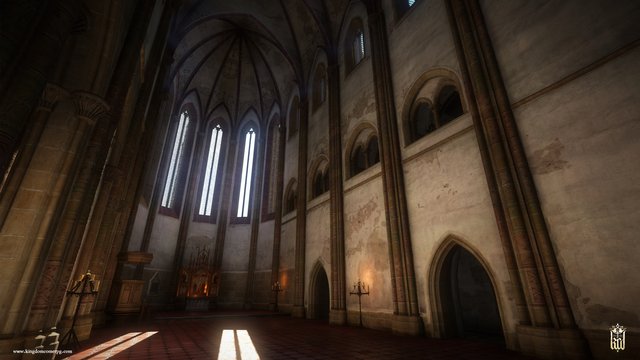
There's an incredible depth of simulation of mechanics here. It matters how well groomed you are, what type of clothing/armour you're wearing - even the colour and reflectivity of it. NPCs have their own schedules, some are night owls, while others shut their shops early.
RPGs have always been my favourite genre. Back in the day, you knew what an RPG was - games like Baldur's Gate, Mass Effect, or The Elder Scrolls. Today, RPG influence has spread all over gaming. There's definitely a spectrum to the "RPG-ness" of a game. Kingdom Come: Deliverance is a true RPG. By this, I mean, of course it has the levelling up, skills, intricate dialogue with choices and consequences that you'd expect of an RPG. But what makes it more of an RPG than most other so-called RPGs is in the freedom of movement and gameplay.
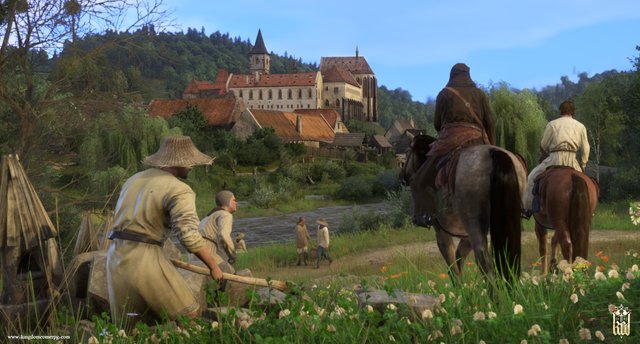
Quest objectives are often pretty straightforward and vague, you can approach things from multiple different angles, and even improvise your own. In an early mission, your objective is to escape from a fort. The log gives you various options, but in an impulse, I just jumped off the bridge! Almost died, but hey, I achieved my objective. This is what a true sandbox looks like, and the detailed simulation offers you a plethora of tools and mechanics. You build your own character, and do things your way, truly role-play. My character was a sneaky bastard, who would look to solve most issues through thievery, pickpocketing and sweet talking. I sucked at combat, but it doesn't really matter - you can finish the entire game without killing anyone. (Indeed, there's an achievement for it) Or, you can be murderous maniac. You do you.
Narratively, though, KCD is not as flexible. It's much more like The Witcher 3: Wild Hunt in this regard. With a speaking protagonist, and complex storyline, things usually end up in the same place. Sure, the journey and details are always vastly different, but the destination is by and large the same for the main beats of the game. There's some tremendous writing in the game, with memorable characters aplenty. Some of the side-quests do verge on the filler territory, but overall, KCD is one of the best written RPGs of the generation. Crucially, it avoids some of the cliches that even the best games in the genre fall prey to. The music is wonderful, and plays a big part in the overall immersion of the game.
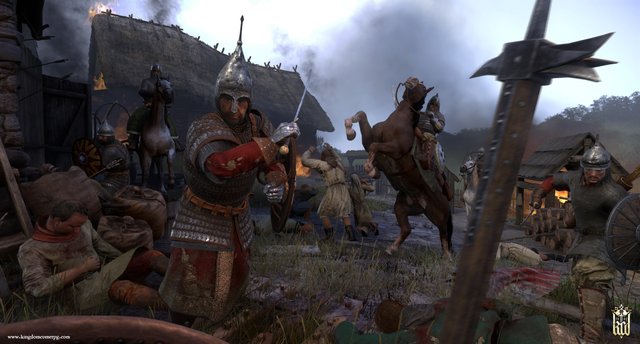
KCD's DLCs are pretty interesting, each one being distinctive. The first DLC is all about rebuilding a town, setting up shops. It ties into the story of the main game nicely, though it's a bit too easy and quickly becomes a cash cow. Band of Bastards is all about combat and action. For someone who barely had any combat experience with the main game, this was a rude awakening. I had to spend several hours learning to fight before I could attempt this DLC. But that's one of the special attributes to KCD - you have to learn, really learn things, not just learn how to press buttons. The combat is ingenious. Once you learn it and get used to its rhythm, it's balletic, feels very much like a delicate but brutal dance. The third DLC, The Amorous Adventures of Bold Sir Hans Capon... Well, you can tell from the title that this one's going to be a ton of fun, and it is. Finally, comes A Woman's Lot, where you finally get to play as Theresa. It's an incredible, emotional conclusion to the game, replaying the beginning of the game from a different perspective.
Unfortunately, even the Royal edition is still pretty damn janky, with various glitches. The game breaking bugs have been mostly resolved though. I hear the console versions are in a worse state, but should be pretty playable. It's a real shame that they launched it in such a broken state, it severely affected reviews and initial audience for the game. I'm glad to see that it's slowly becoming a classic though. It's a must play for fans of 3D RPGs. I feel the same way about KCD as I did about CD Projekt Red in 2007. I'm calling it right now - Warhorse Studios is the next big thing in gaming. KCD's sequel is one of my most anticipated games of the next generation, and I have no doubt this studio is destined for greatness.